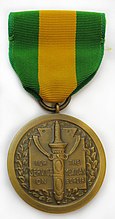Mexican Border Service Medal
| Mexican Border Service Medal | |
|---|---|
 | |
| Type | Service medal |
| Awarded for | National Guard troops federalized for service against Mexico, but who did not qualify for the Mexican Service Medal. |
| Country | |
| Presented by | Secretary of War |
| Status | Obsolete |
| Established | July 9, 1918 |
| Total recipients | 41,000 |
| Precedence | |
| Next (higher) | Mexican Service Medal |
| Next (lower) | World War I Victory Medal |
| Related | Texas Cavalry Medal |
The Mexican Border Service Medal was a U.S. service medal established by an Act of Congress on July 9, 1918.[1] It was awarded for service on the border between May 9, 1916 and March 24, 1917.[1] Additionally, recipients included those who performed duty with the Mexican Border Patrol between January 1, 1916 and April 6, 1917.[1]
History
[edit]The Mexican Border Service Medal recognized military service members who were assigned to the U.S.-Mexico border when the United States was engaged in the Pancho Villa Expedition, a military operation conducted against the paramilitary forces of Francisco "Pancho" Villa during the Mexican Revolution.[2] The U.S.-Mexico border was a potential location for a German-funded invasion by Mexico, which was exposed by British interception of the Zimmerman Telegram, a communication that detailed Germany's proposal for Mexico to ally with Germany if the United States entered World War I.[3]
Those who received the Mexican Service Medal were not eligible for the Mexican Border Service Medal.[1] The first recipient was Major General Charles M. Clement of Pennsylvania, in recognition of his status as the longest-tenured National Guard officer eligible for the award at the time it was authorized.[4] Congress created a similar award for members of the Texas National Guard who served on the border between December 8, 1917 to November 11, 1918, the Texas Cavalry Medal.[5]
Description
[edit]As approved by the U.S. Congress:[6]
The medal of bronze is 1 1/4 inches in diameter. On the obverse is a sheathed Roman sword hanging on a tablet on which is inscribed For service on the Mexican border. The tablet is surrounded by a wreath. The reverse is the same as that of the Spanish War Service Medal. The medal is suspended by a ring from a silk moire ribbon 1 3/8 inches in length and 1 3/8 inches in width composed of a green band (7/16 inch), yellow band (1/2 inch), and green band (7/16 inch).
See also
[edit]References
[edit]- ^ a b c d U.S. Army Adjutant General (1950). The Army Almanac: A Book of Facts Concerning the Army of the United States. Washington, DC: U.S. Government Printing Office. p. 680 – via Google Books.
- ^ Yockelson, Mitchell (Winter 1997). "The United States Armed Forces and the Mexican Punitive Expedition: Part 2". Prologue Magazine. Washington, DC: U.S. National Archives and Records Administration. Retrieved January 4, 2024.
- ^ "Zimmermann Telegram: Germany's secret proposal to Mexico, discovered". The World War.org. Kansas City, MO: National WWI Museum and Memorial. Retrieved January 4, 2024.
- ^ "General Clement Gets Two Medals". Harrisburg Telegraph. Harrisburg, PA. June 24, 1919. p. 2 – via Newspapers.com.
- ^ Annual Report of the Chief of the Militia Bureau. Washington D.C.: Government Printing Office. 1926. pp. 54–55. Retrieved September 9, 2015 – via Google Books.
- ^ "Title 32 CFR 578.39: Mexican Border Service Medal". Code of Federal Regulations (Annual Edition). Washington, DC: U.S. Government Printing Office. July 1, 2002. Retrieved January 4, 2024.
External links
[edit] Media related to Mexican Border Service Medal at Wikimedia Commons
Media related to Mexican Border Service Medal at Wikimedia Commons
